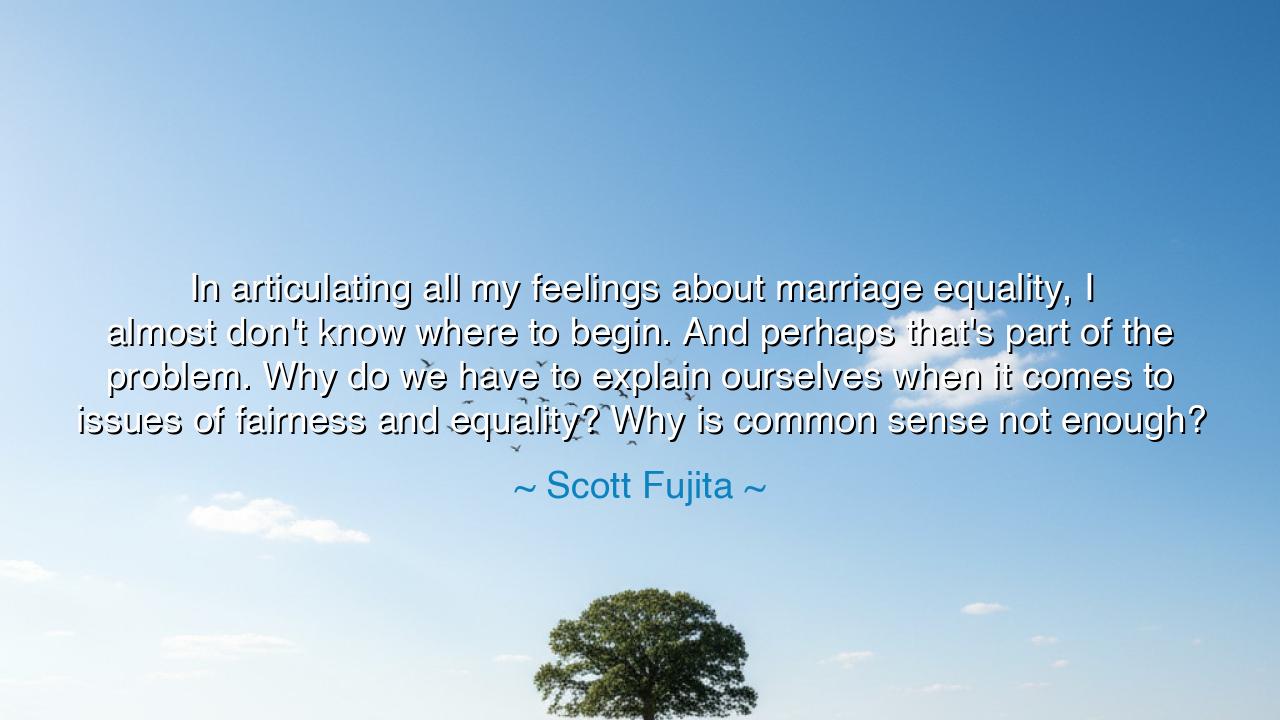
In articulating all my feelings about marriage equality, I almost
In articulating all my feelings about marriage equality, I almost don't know where to begin. And perhaps that's part of the problem. Why do we have to explain ourselves when it comes to issues of fairness and equality? Why is common sense not enough?






In the impassioned words of Scott Fujita, a man whose strength was not only of the body but of the spirit, we hear the cry of reason met with disbelief: “In articulating all my feelings about marriage equality, I almost don’t know where to begin. And perhaps that’s part of the problem. Why do we have to explain ourselves when it comes to issues of fairness and equality? Why is common sense not enough?” These words speak to the deep frustration of those who must justify what should already be self-evident. Fairness, equality, and dignity—these are not privileges to be debated, but birthrights to be honored. Fujita’s lament is not just about marriage, but about humanity’s strange blindness: that even in the face of truth, we demand explanations for compassion.
The origin of this quote lies in Fujita’s role as both athlete and advocate. A former NFL linebacker, he stood as an unexpected yet powerful voice for marriage equality during a time when many in the world of sports shied from such conversations. His courage to speak came not from politics, but from conscience. Having been adopted by a Japanese-American father and raised with a profound sense of justice, Fujita knew the sting of prejudice and the necessity of empathy. When he spoke these words, he spoke not as a man defending an idea, but as one defending humanity itself—the simple truth that love and equality require no defense.
The ancients, too, wrestled with this paradox of truth unheeded. In the days of Socrates, the philosopher was condemned for teaching virtue and questioning ignorance. His crime was not falsehood, but honesty. “Why must I explain,” Fujita seems to echo, “that kindness is right, and oppression is wrong?” When justice becomes a thing to argue rather than assume, society reveals its sickness. For what is common sense if not the whisper of conscience in the human heart? Yet the world has often turned its back on that whisper, building walls where bridges should be, demanding proof for what compassion already knows.
Consider the story of Mildred and Richard Loving, a Black woman and a white man whose marriage was deemed illegal in Virginia in the 1960s. Their only crime was love. Arrested in the dead of night, exiled from their home, they endured years of humiliation. When their case reached the Supreme Court, their lawyer asked the simplest question: “What is the foundation of the right to marry?” The answer, finally given, was the same that Fujita cries for—common sense. The Court declared that “the freedom to marry is one of the vital personal rights essential to the orderly pursuit of happiness.” It took the highest court in the land to affirm what every child already knows in their heart: that love is not a privilege to be permitted, but a truth to be recognized.
Fujita’s words strike at the deeper wound—that progress often requires endless justification. Those who ask for equality must first endure suspicion, ridicule, and delay. They must argue not only for their rights, but for their right to have rights. Yet in this endurance there is a kind of holiness. Each explanation, though wearisome, becomes a teaching for generations yet unborn. As the ancients said, “Justice is a slow-moving god, but her feet never falter.” Every word spoken in defense of fairness carves another stone on the path toward enlightenment.
And still, Fujita’s question burns: “Why is common sense not enough?” It is because humanity often mistakes comfort for wisdom. We cling to traditions even when they contradict truth. We fear change even when it promises freedom. But as history has shown, from the abolition of slavery to the recognition of women’s rights, what is once controversial will one day seem obvious. The progress of civilization is the slow awakening of common sense—the moment when the many finally see what the few have long known.
So let this quote be both mirror and call to action. Fairness does not require explanation, but defense; equality should not need argument, yet it needs champions. When the world demands reasons for compassion, give them courage instead. When others seek justification for justice, stand unwavering in your truth. Let your life itself be the argument—that love, dignity, and freedom are not causes to be proven, but conditions to be lived.
Thus, as the ancients would say, the measure of a civilization is not in its wealth or power, but in how swiftly it recognizes what should never have been questioned. Scott Fujita’s words remind us that the highest wisdom is simple: to see each other as human. And when the world forgets that truth, it is our sacred duty to speak it again—calmly, bravely, and without apology—until common sense at last becomes common.






AAdministratorAdministrator
Welcome, honored guests. Please leave a comment, we will respond soon